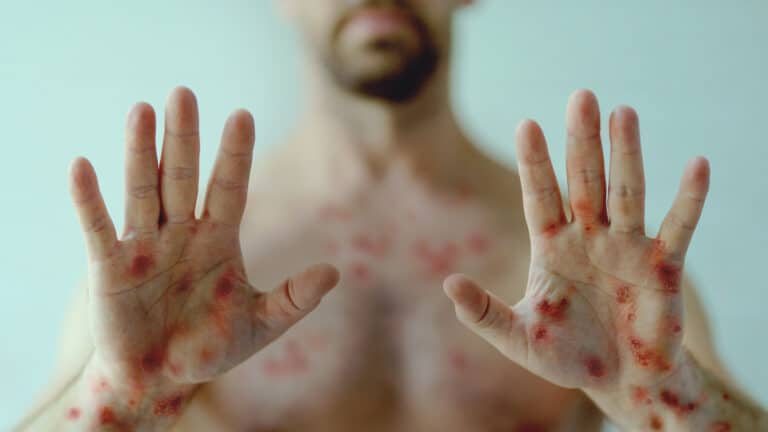It is estimated that up to 45% of people with bipolar disorder also exhibit symptoms of alcohol abuse. These statistics might be alarming but having bipolar doesn’t necessarily mean that alcoholism is soon to follow.
The relationship between alcohol and bipolar is complex. There are many risk factors to take into consideration, including the motivations behind drinking.
Let’s take a closer look at the inner workings of these disorders.
Bipolar Disorder
Bipolar disorder is a mental health condition indicated by extreme variations in mood. It does not affect everyone in the same way. The classifications of bipolar depend on the nature and severity of the symptoms.
Bipolar I Disorder
This is the most intense form of bipolar disorder. It is characterized by intense feelings and high energy levels, known as mania. At times it can become so intense that the person disconnects from what is real.
Manic episodes do not have to occur regularly. The occurrence of one episode in a lifetime is enough to fall into this category.
Bipolar II Disorder
This type has similar highs and lows to bipolar I, but without mania. The emotional highs are less pronounced, so the person won’t lose touch with reality.
People with bipolar II are often misdiagnosed with depression. It is classified by experiencing at least one episode of severe depression.
Cyclothymia
This is a milder version than bipolar I and II. People often experience more stability between mood swings. High and lows are less pronounced with cyclothymia.
Rapid Cycling
This is a type of bipolar disorder that does not fall into one of the other three categories. It involves rapid fluctuations between manic and depressive states. People will this type of bipolar experience four or more episodes in one year.
Symptoms of mania:
- Anger and irritability
- Less need for sleep
- Heightened energy levels
- Aggressive impulses
- Rapid thoughts and speech
- Elaborate thinking
Symptoms of depressive episodes:
- Fatigue
- Sad or negative thoughts
- Indifference
- Anxiety
- Lack of concentration
- Lack of joy
- Withdrawal from social environments
- Thoughts of death or self-harm
About 12 to 24 percent of people with other types of bipolar disorder will eventually develop rapid cycling.
Relationship Between Bipolar and Alcohol
Being diagnosed with bipolar disorder doesn’t mean that drinking alcohol is impossible. But it does place the person at higher risk for developing alcohol abuse disorder. Here are several factors to consider before opening a new bottle of wine.
Genetic Tendencies
There is a higher risk of developing alcohol abuse and bipolar disorder when they are present in other family members. This does not mean that a bipolar diagnosis will inevitably lead to alcoholism.
It only means that if someone with bipolar has an alcoholic family member, they should be careful. Even without bipolar, their genetics place them at a higher risk for alcohol abuse.
Some studies do suggest that the two disorders share genetic risk factors. Concrete scientific evidence has yet to support this claim.
Reckless Behavior
Alcohol can exacerbate the symptoms of bipolar disorder. People with bipolar tend to be impulsive. They wait until after a decision is made to consider the consequences.
Alcohol consumption increases the severity of manic symptoms. This includes irrational and risky behaviors, such as violence, aggression, and substance abuse.
Even a person who intends to drink responsibly should consider the potential for losing control.
Mixing with Medications
Many people take medications to manage their bipolar and not every medication mixes well with alcohol. It’s important to check the labels for potential side effects and warnings about use with alcohol.
Alcohol might dilute the efficacy of the medication. Or it could react negatively and place the person’s life in danger.
Motivation
It’s important to consider the reason behind the desire to drink. Is it to celebrate a special occasion? Is it part of a cultural event of religious practice?
There is nothing wrong with enjoying an alcoholic beverage that pairs well with a meal. However, oftentimes the motivation behind drinking alcohol is to escape.
People with bipolar might seek to numb their emotions or relieve symptoms through alcohol consumption. Some might even consume it to encourage a higher level of elation during a manic episode.
These types of behaviors increase the risk of irrational decision-making. They also place the person in a position to develop an alcoholic dependency.
When emotions start to feel uncontrollable, it is important to seek professional assistance.
Symptoms of Alcohol Use Disorder
Like bipolar disorder, alcohol use disorder has different levels of severity. It can easily escalate from mild to extreme and is characterized by patterns of uncontrolled drinking.
Common symptoms of alcohol use disorder include:
- Inability to limit drinks
- Binge drinking
- Strong cravings to drink alcohol
- Using alcohol in dangerous situations, such as driving
- Abandoning obligations and hobbies
- Feeling a need to “cut back” on drinking
People with severe alcohol use disorder often experience withdrawals when they stop drinking. Initially, they might even find it difficult to function normally while sober.
Treating Bipolar Disorder and Alcohol
There are different schools of thought when it comes to treating these disorders.
Separate Treatment: A lot of doctors like to look at and treat each disorder separately. This can be effective but often results in inadequate treatment and slower recovery time.
Dual Treatment: In this method, both disorders are treated at the same time, but separately.
Integrated Treatment: This is where both disorders are acknowledged and treated together.
Simultaneous treatment methods are continuing to grow in popularity. But not every person responds the same and results may vary.
Bipolar and Alcohol
Dealing with bipolar disorder may seem overwhelming and intimidating. People might end up feeling isolated or excluded from participating in normal social activities.
Although many things place those with bipolar disorder at a higher risk for alcohol abuse, the two don’t have to go hand in hand.
It is important to have a healthy relationship with alcohol. Know whether the motivation behind the drink is healthy or not and avoid drinking while experiencing a manic or depressive episode.
There are lots of treatment and support options for those with bipolar disorder. Contact us today to learn more.






